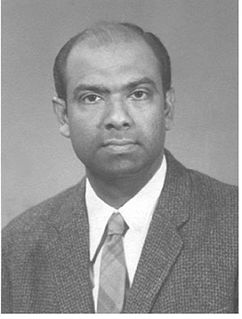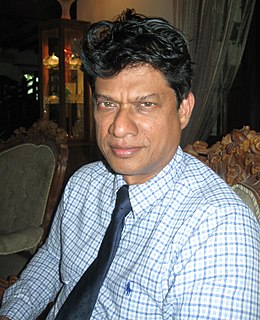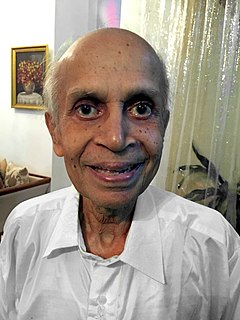
The Colombo Plan is a regional organisation that represents a collective intergovernmental effort to strengthen economic and social development of member countries in the Asia-Pacific region. The primary focus of Colombo Plan activities is on the development of human resources in the region.
The College of Community Physicians of Sri Lanka (CCPSL) is the professional association of the Public Health Practitioners in Sri Lanka. The membership consists of specialists in Community Medicine and master's degree holders in Community Medicine. In addition to these professionals, there are members from other specialties as well. This organisation is incorporated by an act of Parliament No.18/99.
North Colombo Medical College (NCMC) was the first privately funded medical school in Sri Lanka. It started in 1980 with the admission of 100 local and 20 foreign students. The first batch of students began graduating in 1990. Founded by the College of General Practitioners of Sri Lanka, Dr. G. M. Heenilame was its first chairman and Dr. W.D. Ratnavelle, its first director. It was nationalized in 1989 and became the Faculty of Medicine, University of Kelaniya. The first batch of students of the Faculty of Medicine, University of Kelaniya completed their five-year course and graduated with the MBBS degree in September 1996.
Sri Lanka has a free and universal health care system. It scores higher than the regional average in healthcare having a high Life expectancy and a lower maternal and infant death rate than its neighbors. It is known for having one of the world's earliest known healthcare systems and has its own indigenous medicine system.
E.M. Wijerama, FRCP was a Sri Lankan physician and philanthropist. He was the first President of the Ceylon College of Physicians and former President of the Ceylon Medical Association.

Devaka Fernando, MBBS, MSc, MD, FRCP, is aSri Lankan physician and academic. He was president of the Osteoporosis Society of Sri Lanka and a professor of medicine at the University of Sri Jayawardanapura.
Vidya Jyothi Mohamed Hussain Rezvi Sheriff, FRCP (Lon), FRCP (Edin), FRACP, FCCP, FSLCGP, FNASSL is a Sri Lankan academic and physician. He is the director of the Postgraduate Institute of Medicine; senior professor of medicine; head of the Department of Clinical Medicine at the Faculty of Medicine, University of Colombo. He is also a consultant physician and nephrologist at National Hospital Sri Lanka.
Professor H. Janaka de Silva is a Sri Lankan physician and academic. He is the Professor of Medicine at the University of Kelaniya. He was appointed as Director of the Postgraduate Institute of Medicine at the University of Colombo in 2014, and is also Chairman of the National Research Council of Sri Lanka
Ravindra Fernando is a Sri Lankan forensic pathologist, toxicologist, physician, author and academic. He is the current chairman of the National Dangerous Drugs Control Board of Sri Lanka.
Dr Christopher Gunapala Uragoda MBBS (Ceylon), MD (Ceylon), Hon. DSc (Colombo), FRCP (Edin), FRCP (Glasg), also known as Chris Uragoda, is a Sri Lankan physician, author, folklorist, historian and conservationist

Upendra Srinath Jayawickrama (FRCP), is a Sri Lankan physician (endocrinologist) and an artist. He was the founder of the Diabetes Association of Sri Lanka and a professor of pharmacology at the North Colombo Medical College.

Dr Bothalage Desmond James Stanley Fernando (1930–2012) was a Sri Lankan doctor and inventor, best known for his services to General Practice in the country.
Dr Warusahennadige David Lionel Fernando was a Forensic pathologist and Judicial Medical Officer (JMO) for Colombo.
The Sri Lanka Medical Library (SLML) is a library which was started in 1844 as the Colonial Medical Library. Later the name changed to Ceylon Medical Library and then to Sri Lanka Medical Library. It is the oldest western medical organization in Sri Lanka.
Dr Peter Daniel AnthoniszMD was a well-known burgher doctor who was the first Ceylonese to obtain an M.R.C.P. and F.R.C.S. He was also the inaugural president of the Ceylon Branch of the British Medical Association and a member of the Legislative Council for nine years.

Professor Arjuna Priyadarsin de Silva MBBS, MSc, MD, FRCP(Lon) is a Sri Lankan Academic and Consultant Gastroenterologist. He is the Head of the Department of Medicine, Faculty of Medicine University of Kelaniya and Chairman of the Sri Lanka Anti-Doping Agency (SLADA).
The Sri Lanka Medical Association (SLMA) is the professional association for doctors and surgical professionals in Sri Lanka. It is considered to be the oldest national professional organisation of medical professionals in Australasia. The association does not regulate or certify doctors, a responsibility which lies with the Sri Lanka Medical Council.

Carlo Fonseka is a Sri Lankan physician, academic and political activist. He is a former dean of the Faculty of Medicine, University of Kelaniya and a former president of the Sri Lanka Medical Council.
Gankande Muhandiramge Heennilame is a Sri Lankan physician. He is the founder and chairmen of the North Colombo Medical College, which was the first private medical school in Sri Lanka.







